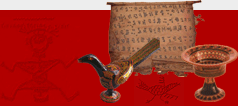|
凉山雷波吉木家支世传文献的语音系统
The Phonetic System of the Traditional Documents Handed
down through Generations of the Jjimu Clan of Leibo, Liangshan
曲木铁西 吉木阿龙 Qumu Tiexi & Jimu Along
中央民族大学人事处
凉山州奴隶社会博物馆
【摘要】雷波县八寨乡牛龙村吉木特阔家世传有一批重要的文物和彝文古籍,这批文物有镶铜布帽、木牍、竹简、木印章、皮书、旗帜、骨印章、编连骨刻、拼版骨刻、纸张等十类550余件。从这些文物刻写的材料来看,不仅年代久远,且与现代彝语的语音不尽相同,自成体系。其最显著的特点是,相当数量的文字,从其语音来看,一个文字,读音常常为多个音节,且与现代凉山彝语的读音不同;从其语义来看,大多由多个义素构成,具有文字发展早期阶段的一些特质。其语音系统中包含有许多现代凉山彝语中已不存在的音素。本文通过吉木家长子吉木阿龙作为这批文献发音人的读音为依据,记录了这批文献文字的语音,整理出其语音系统,揭示其语音特点。在此基础上,论述了这批文献对彝族语言与文字研究的价值,以丰富汉藏语言研究。
Abstract
The Jjimu Tiho family of Niulong Village, Bazhai Towship,
Leibo County has a collection of important artifacts and
Yi language documents. The artifacts include a cloth hat
with copper inlays, wooden and bamboo writing slates, wood
and bone seal stamps, rawhide books, banners, carved bone
texts and printing plates, and paper texts, over 550 pieces
in all. Looking at the texts carved and written on these
artifacts, not only are they very old, but they do not completely
match the phonetic system of contemporary Nuosu Yi language,
but rather comprise a system of their own. Their most notable
characteristic is that a considerable number of the characters,
when looked at from the standpoint of their meaning, are
made up of several semantic elements, giving them some characteristics
of a very early stage in the development of writing. Their
phonetic system includes several phonemes that are no longer
present in contemporary Liangshan Nuosu speech. This essay
uses the phonetic readings given to these texts by Jimu
Alu, the eldest son of the Jimu family as the basis for
recording the phonology of these texts, sorting out their
phonological system, and describing their phonological characteristics.
On this basis we go on to discuss the value of these documents
for Yi linguistics and for the study of writing systems,
and ultimately enriching the study of Sino-Tibetan linguistics.
作者简介:
曲木铁西,男,彝族,出生在四川乐山市峨边彝区,1977至1979年在家乡做过中小学教师。1983年毕业于西南民族学院,1983至1989年在四川省教育厅民族教育处工作。1992年毕业于中央民族大学语言学专业,获硕士学位。此后留校从事民族高等教育的教学、管理和研究工作,曾任中央民族大学成人教育处副处长、成人教育学院副院长、常务副院长、院长,现任中央民族大学人事处处长,教育学专业硕士生导师,国家教育部世界银行贷款项目中方专家、国际双语学会常务理事。学术专长:语言学和少数民族教育学。发表有《彝语名量词的起源层次》、《彝语义诺话的撮唇音与长重音》、《彝语义诺话植物名词的语义分析》、《彝语颜色词的语义分析》、《彝语义诺话动物名词的语义分析》、《语义学:多学科研究的焦点》、《双语教育的概念及其分类》、《中国凉山彝族地区的双语教育》、《凉山彝族地区现代教育的改革与发展》、《继承和发展少数民族传统教育是发展民族地区现代教育的基础》等论文五十余篇。出版个人专著〈彝语文基础知识〉、《凉山彝族社会传统教育与现代教育的发展研究》、与人合作出版《中国少数民族教育史》等多部著作。曾获吴玉章学术奖、全国教育科学成果一等奖。
吉木阿龙,男,彝族,雷波县八寨乡牛龙村人,世传毕摩,从小跟随父亲吉木特阔学毕,熟读经书,有世承家学的文献知识。2001年8月,其父将家里保存和秘传的一批具有较高研究和收藏价值的传世彝族甲骨、简牍、皮书等古籍文物公布于众;2001年9月送到在云南省昆明市召开的川、滇、黔、桂四省区彝文古籍第八次协作会上展示;2002年火把节之际,吉木阿龙代表全家将这批祖传的古代彝文实物共计17件,郑重地捐赠给了凉山彝族奴隶社会历史博物馆收藏,自己也成为该馆破格录用的一名博物馆实习研究馆员。
About the authors:
Quomu Tiexi (Qomo Tixy) was born in a Yi village in Ebian
County, Leshan City, and was an elementary and secondary
teacher in his home village from 1977-1979. He graduated
from Southwest Nationalities College in 1983, and worked
in the Minority Education Division of the Sichuan Provincial
Educational Department from 1983-89. In 1992 he received
an M.A. in linguistics from the Central University of Nationalities.
After this, he remained at the University working in minority
higher education, as well as administration and research,
and has served as vice-head of the Office of Adult Education,
Associate Dean, Senior Associate Dean, and Dean of the Adult
Education College, and is now head of the Personnel Office
of the Central Nationalities University, supervisor in the
M.A. in education program, a specialist on the Chinese side
of the World Bank Project for the Ministry of Education
of China, and a managing director of the Society for the
Study of International Bilingual Education. His academic
specialties are linguistics and minority education. He has
published over fifty articles, including "The Origin
of Noun Classifiers in Yi," "Bilabials and Long
Vowels in Yynuo Yi," "Semantic Analysis of Plant
Nouns in Yynuo Yi," "Semantic Analysis of Yi Color
Terms," "Semantic Analysis of Yynuo Yi Animal
Nouns," "Semantics: A Focus of Interdisciplinary
Research," "Concepts and Types of Bilingual Education,"
"Bilingual Education in Yi Districts of Liangshan,
China," "Reform and Development of Contemporary
Education in Liangshan Yi Areas," and "Inheriting
and Developing Traditional Education in Minority Areas is
the Basis for Reform and Development of Contemporary Education
in Minority Areas." His sole authored books are Basic
Knowledge about Yi Language, and Research on the Development
of Traditional and Contemporary Education in Yi Areas. He
has also co-authored several books, including The History
of Minority Education in China. He has received the Wu Yuzhang
Prize for scholarship and the national first prize for educational
scholarship.
Jimu Along (Jjimu Alo) is a Nuosu Yi from Niulong Village,
Bazhai Township, Leibo County, a hereditary bimo who learned
the bimo skills from his father Jjimu Tiho in his boyhood.
He was an avid student, and has great knowledge of the bimo
learning passed down in his family. In August, 2001, his
father openly disclosed a series of formerly secretly held
goods with both scholarly and collector value, passed down
for many generations, including shell and bone inscriptions,
bamboo slates, rawhide books and other materials; and in
September of the same year took them to Kunming to be exhibited
at the eighth Sichuan, Yunnan, Guizhou, Guangxi cooperative
conference on Yi traditional documents. Around the Fire
Festival in summer 2002, Jjymu Alur, on behalf of the family,
presented a total of 17 of these objects to the collections
of the Liangshan Yi Museum of Slave Society in Xichang,
and became an extraordinary curator trainee of that museum.
|





